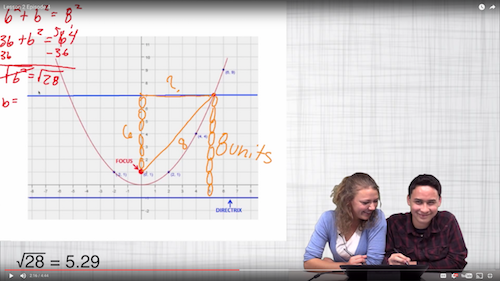MathTalk: Learning through Dialogue
Center for Research in Mathematics and Science Education
San Diego
- Links
- MathTalk
About
The MathTalk Project encompasses two grants from NSF, the first lasting from 2014-2018, and the other lasting from 2019-2024.
The goal of the first grant was to create, investigate, and provide evidence of promise for a model of online videos that embodies a more expansive vision of both the nature of the content and the pedagogical approach than was currently represented in most YouTube-style lessons. Rather than the procedurally-oriented expository approach of videos that dominate the internet, the videos produced for this project focused on developing mathematical meanings and conceptual understanding. They featured pairs of students, highlighting their dialogue, explanations, and alternative conceptions. Two units, focused on parabolas (below) and proportional reasoning, were developed for this project.

Despite the growth in the availability of mathematics videos online, little research had investigated student learning from them. Consequently, a major part of this work was a set of four vicarious learning studies (vicarious learning refers to learning from video- or audio-taped presentations of other people learning). Qualitative studies investigate the particular meanings and ways of reasoning that learners appropriate from observing the dialogue of the students in the videos, as well as the learning trajectories of vicarious learners for each unit. Quantitative studies isolated and tested the effectiveness of the dialogic and the conceptual components of the model by comparing learning outcome gains for (a) conceptual dialogic versus conceptual expository conditions, and (b) dialogic conceptual versus dialogic procedural conditions.
The second grant has continued this work. The goal of the second project is to develop five additional video units that feature the unscripted dialogue of pairs of students. The project team has used the filming and post-production processes established during the first grant to create a repository of five dialogic mathematics video units that target important Algebra 1 and 2 topics for high school and upper middle school students, though the approach can be applied to any STEM topic, for any age level. The project team will also conduct eight research studies to investigate the promise of these unscripted dialogic videos with a diverse population to better understand the vicarious learning process, which refers to learning from video- or audio-taped presentations of other people learning.
Additionally, the project team is providing broader access to the project videos and support for a variety of users, by: (a) subtitling the videos and checking math task statements for linguistic accessibility; (b) representing diversity of race, ethnicity, and language in both the pool of students who appear in the videos and the research study participants; (c) providing teachers with an array of resources including focus questions to pose in class with each video, printable task worksheets, specific ways to support dialogue about the videos, and alignment of the video content with Common Core mathematics standards and practices; and (d) modernizing the project website and making it functional across a variety of platforms.
Grants
First Grant:
Project Name: Re-imagining Video-Based Online Learning
PI: Joanne Lobato
Funding: National Science Foundation Discovery Research K-12 Program, Grant DRL-1416789. September 2014- August 2018.
Second Grant:
Project Name: Developing and Investigating Unscripted Mathematics Videos
PIs: Joanne Lobato, John Gruver (Michigan Technological University)
Funding: National Science Foundation Discovery Research K-12 Program, Grant DRL-1907782. September 2019- August 2024.
Media
MathTalk Introductory Video
